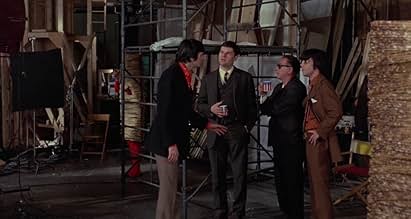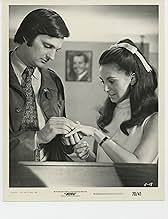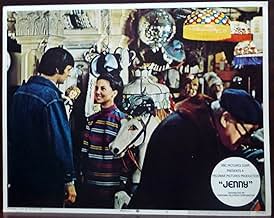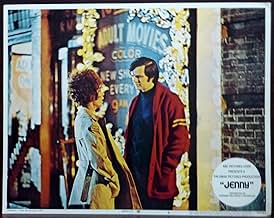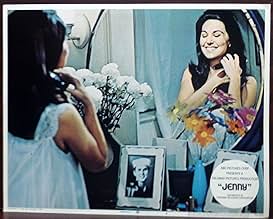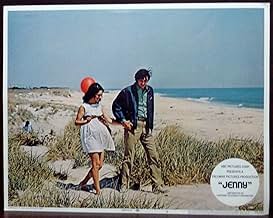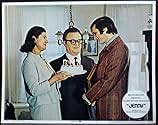Adicionar um enredo no seu idiomaAn unwed mother-to-be marries a total stranger who is avoiding the draft. She now has a father for her child, and he doesn't have to join the Army--but their marriage of convenience soon bec... Ler tudoAn unwed mother-to-be marries a total stranger who is avoiding the draft. She now has a father for her child, and he doesn't have to join the Army--but their marriage of convenience soon becomes true romance.An unwed mother-to-be marries a total stranger who is avoiding the draft. She now has a father for her child, and he doesn't have to join the Army--but their marriage of convenience soon becomes true romance.
- Direção
- Roteiristas
- Artistas
- Prêmios
- 1 indicação no total
Fay Bernardi
- Woman on Bus
- (não creditado)
Robby Galvin
- Boy
- (não creditado)
Max D. Hoffman
- Baby
- (não creditado)
Timothy Ousey
- Boy
- (não creditado)
Florence Stanley
- Woman at Playground
- (não creditado)
- Direção
- Roteiristas
- Elenco e equipe completos
- Produção, bilheteria e muito mais no IMDbPro
Avaliações em destaque
Strange little movie made in New York, in 1969. Almost feels like a film student's graduation piece. Sometimes the sound is terrible or the inappropriate soundtrack drowns out the dialogue. Another disappointment is that there isn't much location or atmosphere, so you really don't get the feel of the time or the place, which is often the fun aspect of seeing films of this period.
But the character development is good. The characters grow on you in an intriguing way. It's the sort of movie that's nice to catch on TV on a wet Sunday afternoon and the sort of movie they should run on wet Sunday afternoons but for some reason remains in the archives forever.
If you like Marlo Thomas and or Alan Alda, it's interesting to see them in their youth. Sometimes their performances seem wooden, partly due to the often poor direction, other times quite sensitive and as I said, intriguing. I'm glad I watched it.
But the character development is good. The characters grow on you in an intriguing way. It's the sort of movie that's nice to catch on TV on a wet Sunday afternoon and the sort of movie they should run on wet Sunday afternoons but for some reason remains in the archives forever.
If you like Marlo Thomas and or Alan Alda, it's interesting to see them in their youth. Sometimes their performances seem wooden, partly due to the often poor direction, other times quite sensitive and as I said, intriguing. I'm glad I watched it.
The less said, the better. Even worse than Clint Eastwood's THE BEGUILED.
Marlo Thomas plays Jenny, a single, naïve working girl living on her own who has managed to get herself pregnant (she was afraid of asking her family doctor for birth control pills, but since she doesn't live at home anymore this seems like a flimsy excuse). She's intent on raising the child alone until she meets a director of commercials in the park who has 30 days before he'll be inducted involuntarily into the Army. They go out on a date, realize they're both in a jam, and he proposes marriage--to him, it's just a way to dodge the draft (he already has a steady girlfriend), but she wants to feel like a real bride. George Bloomfield co-wrote and directed this rather simplistic drama that could have cut much deeper, but between Thomas' mood swings and Alan Alda's morose state (to show us his indifference) there aren't many opportunities for substantial drama. She wants to discuss baby names, he doesn't care; he wants to go out with his friends, she wants to stay home with him and be a couple. Bloomfield gets some very good moments from Thomas' situation in dealing with her Republican parents (a baffling couple played by Vincent Gardenia and Elizabeth Wilson, who played practically the same characters a year later in "Little Murders"). Unfortunately, Bloomfield doesn't know how to mount his story without resorting to melodrama (few of his ideas are fresh, and he runs out of them awfully fast). Thomas acts more simply and plainly than on her TV series "That Girl"; she still dresses like a fashionable big city waif, but the lower-key she affects here is engaging for a while (before the movie falls apart). David L. Quaid did the very fine cinematography; Michael Small composed the light, inoffensive score. ** from ****
This is a boring mess. It tries to combine cinema verite', neo-realism, artistic montages, reverse camera angles, and improvisation. The two leads are boring and insipid characters that no one could care about -- not even themselves. It pretends to have a bold statement to make about single motherhood. And the statement turns out to be, "Isn't it sad?" Unless you have a mad desire to occupy your life with this mess for two hours, skip it.
This is a little piece of autobiography, I suspect. It is really best for giving you a glimpse into some chapter of the screenwriter's life or the life of someone he knew. This is in part a story of New York City and the film makers's lfestyle there. It is about a contrast between the educated and sophisticated and a simpler person. Or at least this is a subtext of the movie, I think.
On the surface, this is about a young girl who gets impregnated by someone who was/is a friend of a NYC filmmaker. He makes commercials. It is an all comsuming business for him. He is knowledgeable and sophisticated. Some friend of his impregnated some country girl who made it to New York. Then this friend moves away and Alda, the filmmaker, is placed in the position of having this pregnant, naive young girl living with him. I think the impregator-friend was his roommate, and now Jenny, the pregnant young girl, is moving into the apartment, after the friend has left town. Or something like that.
Well, Alda at first does not have much sympathy or room in his life for this girl. He sort of ignores her. But they develop a relationship. And so forth.
Not bad, and sort of a window into time and into a certain subculture.
On the surface, this is about a young girl who gets impregnated by someone who was/is a friend of a NYC filmmaker. He makes commercials. It is an all comsuming business for him. He is knowledgeable and sophisticated. Some friend of his impregnated some country girl who made it to New York. Then this friend moves away and Alda, the filmmaker, is placed in the position of having this pregnant, naive young girl living with him. I think the impregator-friend was his roommate, and now Jenny, the pregnant young girl, is moving into the apartment, after the friend has left town. Or something like that.
Well, Alda at first does not have much sympathy or room in his life for this girl. He sort of ignores her. But they develop a relationship. And so forth.
Not bad, and sort of a window into time and into a certain subculture.
Você sabia?
- CuriosidadesThough Jenny (Marlo Thomas) is supposed to be a cinephile, the script makes a glaring error when the character compares a marital situation to the film Anything Can Happen (1952) "with Nicholas Ray and Judy Holliday." That film actually starred Jose Ferrer and Kim Hunter and was about an immigrant acclimating to American life. The film the screenwriter meant to cite was the same year's The Marrying Kind (1952), which starred Holliday and chronicled a troubled marriage. Her co-star in that film was not director Nicholas Ray, but actor Aldo Ray.
- Erros de gravaçãoJenny refers to the bad marriage between Aldo Ray and Judy Holliday in the movie "The Marrying Kind", but she calls it "Anything Can Happen".
- ConexõesFeatures Um Lugar ao Sol (1951)
- Trilhas sonorasWaiting
Written and Sung by Harry Nilsson (as Nilsson)
Arranged and Conducted by George Aliceson Tipton
Principais escolhas
Faça login para avaliar e ver a lista de recomendações personalizadas
- How long is Jenny?Fornecido pela Alexa
Detalhes
- Tempo de duração1 hora 29 minutos
- Mixagem de som
- Proporção
- 1.85 : 1
Contribua para esta página
Sugerir uma alteração ou adicionar conteúdo ausente

Principal brecha
By what name was É Difícil Ser Feliz (1970) officially released in Canada in English?
Responda
